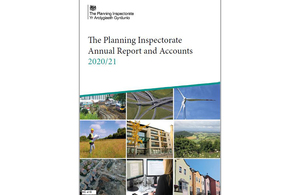The Planning Inspectorate publishes its 2020 Annual Report and Accounts
Adapting and Delivering in the face of Adversity

Today 08 July 2020, The Planning Inspectorate published its Annual Report for 2020/21.
The report shows it adapted the way it works to keep casework moving, despite the pandemic, making around 17,000 recommendations and decisions in England and over 500 in Wales. It implemented safety measures for site visits and held over 700 virtual hearings and inquiries as well as developing a more advanced modelling capability to improve Inspector programming, optimising its use of skills and resources.
Commenting on the achievements highlighted in the report, Sarah Richards, Chief Executive of the Planning Inspectorate said:
In 2019/20, we reported the successful rollout of our performance recovery programme. We significantly improved our casework performance. We made substantial progress with implementing the recommendations of the Rosewell review, and the average time taken to decide appeal inquiries was nearly halved. We had planned to continue with this drive in 2020/21, but the COVID-19 pandemic impacted our plans.
From April 2020 to March 2021, was dominated by managing the impact of the COVID-19 pandemic. The Inspectorate rapidly adapted to working differently and keeping its customers and its people informed on its website, Intranet and social media channels.
In May, the Secretary of State for Housing, Communities and Local Government released a Written Ministerial Statement creating the policy expectation that all hearings and inquiries should be delivered virtually with only a few exceptions. The Inspectorate scaled up its efforts to conduct events online and switched from physical events to virtual ones. This was an innovative and ambitious project that kept casework moving and widen attendance.
Sarah Richards added:
The impact of the COVID-19 pandemic dominated our thoughts and influenced our actions throughout last year. My overarching feeling is of pride in our response to change and the achievements the Planning Inspectorate has made.
Prior to the pandemic the Inspectorate was making great strides in improving performance. To continue that improvement it has identified 15 strategic objectives for 2020/24 that will realise its priorities and create a framework to enable it to monitor its progress and performance. The business plans for 2020/21 and 2021/22 support the delivery of these objectives. The Inspectorate’s strategic objectives and business plans align with the priorities set for it by the Ministry of Housing, Communities and Local Government. In the coming 12 months it will reshape its Strategic Plan in response to changing customer expectations, operating environment and legislative changes.
- Improve engagement with customers. (Read our Customer Insight Lead’s blog)
- Provide clear, accurate, easily accessible, transparent and robust information, to enable a modern, efficient and continuously improving planning process.
- Continue to strongly uphold the reputation for values of fairness, openness and impartiality, and the quality of our decision making.
- Improve casework performance and meet the changing demands of the planning system.
- Deliver improved assurance on the efficiency, quality, fairness, openness and impartiality of our decisions.
- Work alongside the Ministry to deliver legislative change, improving the planning system and the end-to-end experience for customers.
- Analyse and share best practice with Local Planning Authorities, to improve the customer experience of the overall planning system.
- Develop our culture of inclusivity to attract, engage and retain a diverse workforce that increasingly represents the communities served, ensuring we have the skills for the future.
- Undertake work to identify community and environmental impact and the impact of the COVID-19 pandemic. This allows adjustment of working practices, contributing to the achievement of sustainable development goals.
- Effectively manage performance and talent to continuously develop organisational capabilities. This will ensure flexible and customer-focused delivery of service and readiness for the future.
- Empower our people to raise issues and consider risks.
- Develop and implement a digital strategy that will maximise the benefits of digital technology to meet evolving customer expectations and to provide greater value to the taxpayer.
- Encourage and value creativity, new ideas and acceptable risk-taking in the development of new services and improvement of current ones.
- Use data to enable the planning sector to operate more efficiently.
- Increase ability to see what is coming and prepare for changes
The full Annual Report and Accounts.
Ends
Journalists wanting further information should contact the Planning Inspectorate Press Office, on: 0303 444 5004 or 0303 444 5005 or email: [email protected]